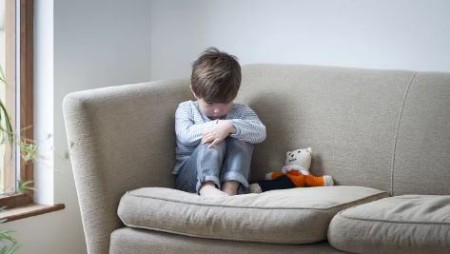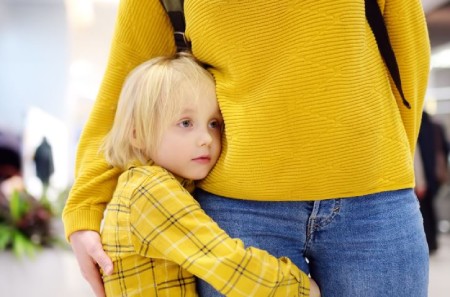
▼ Click the ADS below to unlock continue button ▼
Waiting for ad click...
Fear of death is one of the natural and common fears of humans. This fear can appear at any age, including childhood. Fear of death in children can have many reasons, including:
Reasons for fear of death in children
– Death of a family member or close friend
– Viewing violent or deadly scenes
– Reading or hearing horror stories about death
– Imagine the pain and suffering of death
Symptoms of fear of death in children
– Depression, anxiety and aggression
– Loss of appetite and weight
– Sleep disorder
– Guilt and shame

Severe symptoms of fear of death in children
If your child is afraid of death, they may show the following symptoms:
– Intense and constant fear of death
– Avoid talking about death
– Frequent nightmares about death
– Intense guilt or shame about the death
– Suicidal thoughts
If your child shows these symptoms, it is important to seek help as soon as possible. A professional can help your child manage their fears and feel better.
Strategies to help children manage the fear of death
Here are some strategies to help children manage their fear of death:
– Talk to your child about death. Explain that death is a natural process that happens to everyone.
– Use simple and understandable language. Ask your child what he knows about death and answer his questions.
– Reassure your child that he is not alone. Tell him that many people are afraid of death and that this fear is normal.
Help your child feel more in control. Tell him that he can feel better by talking to you or a family member or close friend.
– Encourage your child to learn about death. Introduce him to books, movies, and articles that explain death in plain language.
Help your child learn stress coping skills. Teach him how to calm down and manage his emotions.
If your child is grieving the death of a family member or close friend, help them process the grief. Tell her that it’s normal to feel sad and help her find ways to express her sadness.
With your help and support, your child can manage his fear of death and feel better.

Fear of death in children of different ages
Fear of death can be different in children of different ages. In young children, fear of death is often associated with fear of separation or disappearance. These children may fear being separated from their parents or other loved ones. They may also fear getting lost or not being able to return home.
In preschool children, fear of death is often associated with fear of injury or pain. These children may fear getting sick, getting hurt, or dying. They may also be afraid of dangerous animals or natural events such as lightning or storms.
In school children, the fear of death is often associated with the fear of the unknown. These children may fear that they do not know what death is or what happens after death. They may also fear that death is the end of everything.
In teenagers, the fear of death is often associated with the fear of adult responsibilities and obligations. These teenagers may fear that they will not be able to make ends meet or care for others. They may also be afraid of missing out on opportunities in their lives.

How to deal with the fear of death in children?
– If your child is afraid of death, it is important to be patient and kind with him. Reassure her that you care about her and want to help her.
– Encourage your child to learn about death. Introduce him to books, movies, and articles that explain death in plain language.
Help your child learn stress coping skills. Teach him how to calm down and manage his emotions.
If your child is grieving the death of a family member or close friend, help them process the grief. Tell her that it’s normal to feel sad and help her find ways to express her sadness.
– With your help and support, your child can manage his fear of death and feel better.
– Choose the right time and place. Choose a time to talk when your child or teen is calm and ready.
– Use simple and understandable language. Avoid giving too much information and avoid using jargon.
– Keep your answers short and concise. If your child or teen has more questions, answer them.
– Allow your child or teen to ask questions. Answer your child’s or teenager’s questions patiently.
– Avoid judging or blaming your child or teenager. Your child or teen may have a variety of feelings about the death, including fear, sadness, anger, or confusion. It is important to acknowledge and respect these feelings.
Frequently asked questions about fear of death in children
1. Is fear of death normal in children?
Yes, fear of death is normal in children. This fear can appear at any age, including childhood. Fear of death is a natural reaction to the unknown. Children are learning and growing and do not yet fully understand death. They may fear the pain of death, separation from loved ones, or what happens after death.
2. What factors can cause fear of death in children?
Various factors can cause fear of death in children, including:
– Death of a family member or close friend
– Viewing violent or deadly scenes
– Reading or hearing horror stories about death
– Imagine the pain and suffering of death
3. What are the symptoms of fear of death in children?
Symptoms of fear of death in children can be different. Some common symptoms include:
– Depression, anxiety and aggression
– Loss of appetite and weight
– Sleep disorder
– Guilt and shame
4. How can children be helped to manage their fear of death?
If you notice that your child is afraid of death, it is important to talk to him and help him manage this fear. Here are some tips to help children manage their fear of death:
Talk to your child about death. Explain that death is a natural process that happens to everyone. Use simple and understandable language and avoid giving too much information to your child.
Answer your child’s questions. Answer your child’s questions clearly and honestly. If you don’t know how to answer a question, tell your child that you need to do more research.
Reassure your child that he is not alone. Tell him that many people are afraid of death and that this fear is normal.
Help your child feel more in control. Tell him that he can feel better by talking to you or a family member or close friend.
If your child’s fear of death is severe or if it interferes with his daily life, it is better to seek help from a specialist. A professional can help your child manage their fears and feel better.
5. When should we worry about fear of death in children?
If your child’s fear of death is severe or is interfering with his daily life, you should be concerned. Severe symptoms of fear of death in children include:
Constant and intense fear of death
Avoid talking about death
Frequent nightmares about death
Intense guilt or shame about the death
Suicidal thoughts
If your child shows these symptoms, it is best to seek help as soon as possible. A professional can help your child manage their fears and feel better.





